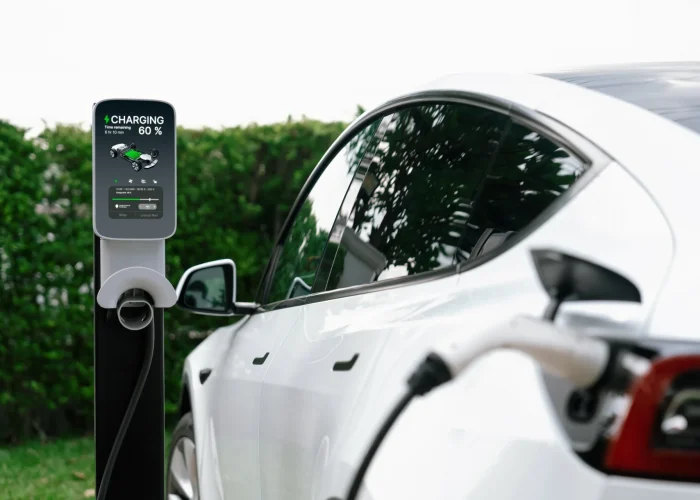Not sure about choosing a charger? Try our revamped Charger Finder!
Try our revamped Charger Finder!
- For Installations
- All our chargers come with a 1 year warranty
- Free Shipping
November 21, 2024
Whether you are completely new to the world of EVs and PHEVs or have already done some research, we are here to help you and clear any doubts.
Clearing misconceptions and helping you to understand how you can successfully charge your car without concern, an understanding of EVSEs (EV chargers) is essential if you intend to make the switch to a fully electric vehicle or a plug-in hybrid.
So, what is an EV charger and how do they work?

If you are new to this topic, you can consider an EV charger just as you would a phone charger.
In function, all EVs, PHEVs, or phone chargers take electricity from your wall outlet at home and fill the battery in your car or mobile when they are connected to the car and left to charge.
However, there are a few types of phone chargers – just as there are a few types of EV chargers:
Several types of outlets support 240V, including the NEMA (National Electrical Manufacturers Association 14-50, 14-30, and 6-50, but more configurations do exist.
As explored above, level 1 chargers are plugged into a regular 120V household outlet.
This type of charger, which simply plugs into a regular outlet, makes it easy and accessible to charge in any household.
This type of EV charger doesn’t require any extra steps and works quite well as a backup charger if you have an EV or fairly well if you have a plug-in hybrid, as the vehicle battery sizes are often smaller.
However, level 1 charging is the slowest way to charge and reach full range in a reasonable amount of time unless you have a PHEV. Level 1 only delivers approximately 4-8 miles of range per hour of charging, meaning it could take 50-70 hours to charge a fully electric vehicle.
Level 1 EV chargers come with either the type 1 J1772 or the NACS Tesla connector. Just make sure you select the one compatible with your vehicle – more on this below.
As mentioned previously, level 2 charging is the most popular charging method for EV and PHEV drivers.
Level 2 chargers will require you to hire an electrician to install a 240V outlet, but it’ll charge your fully electric vehicle overnight or in only a few hours if it’s a PHEV. Some of the popular outlet options are NEMA 14-50, 6-50, 14-30, 6-30, and 6-20, just to name a few.
The ability to charge faster will allow you to use super off-peak hours in the night, making charging a lot cheaper. Plus, even if you charge during the day, you’ll be able to use the full electric range at any given time.
To make faster charging possible, you’ll need to get an electrician to install a 240V wall outlet.
Wall outlets are referred to as NEMA (National Electrical Manufacturers Association) followed by a series of numbers, such as 14-50.
The second number denotes the amperage in which the outlet needs to be installed, according to the electrical code. In this example, the NEMA 14-50 outlet should be installed on a 50A dedicated circuit breaker to work at its full capacity of 40A.
The reason the NEMA 14-50 can’t accept 50A is because outlets can only take 80% of their capacity, this means 40A in this particular case. This is true for all NEMA outlets, no matter the corresponding number.
The NEMA 14-50 is the most popular outlet for EV charging because it has the highest power capacity in addition to ground and a neutral – making it powerful but very safe for its intended use.
That being said, there are other perfectly good 240V options that you can use to charge, such as:
As we briefly discussed, there are two types of vehicle connectors for AC (alternating current) or level 1 and 2 charging in the North American market: the J1772 and the NACS, also known as the Tesla connector.
J1772s are the connector used by most vehicles, except Tesla’s, until Q4 of 2024.
After this point, more brands are accepting the NACS connector for their latest vehicles and launches. Please check the year your car was manufactured to see which connector you need.
Make sure to check before buying J1772 chargers or else you’ll need an adapter to convert to the correct connector.
To charge in fast public DC charging stations, you’ll use the same NACS connector if you have a Tesla or a 2024 Q4 EV that came with the NACS. However, if you have any other EVs from previous years or early 2024, you’ll use the CCS1 connector.
The CCS1 connector is basically your J1772 with two additional holes for DC fast charging. When you get to the charging station, you´ll see the connector head has two additional prongs that connect underneath the J1772, which will allow you to charge faster.
If you are still wondering if you can make an EV work for you, why not contact the team at EV-Chargers?
Based in California – the EV capital of the USA – we use our experience and knowledge daily to pair fully electric or plug-in hybrid drivers with the right EV charger for their needs.
For advice, email us at [email protected] or fill in our contact form and we’ll get back to you as soon as possible.